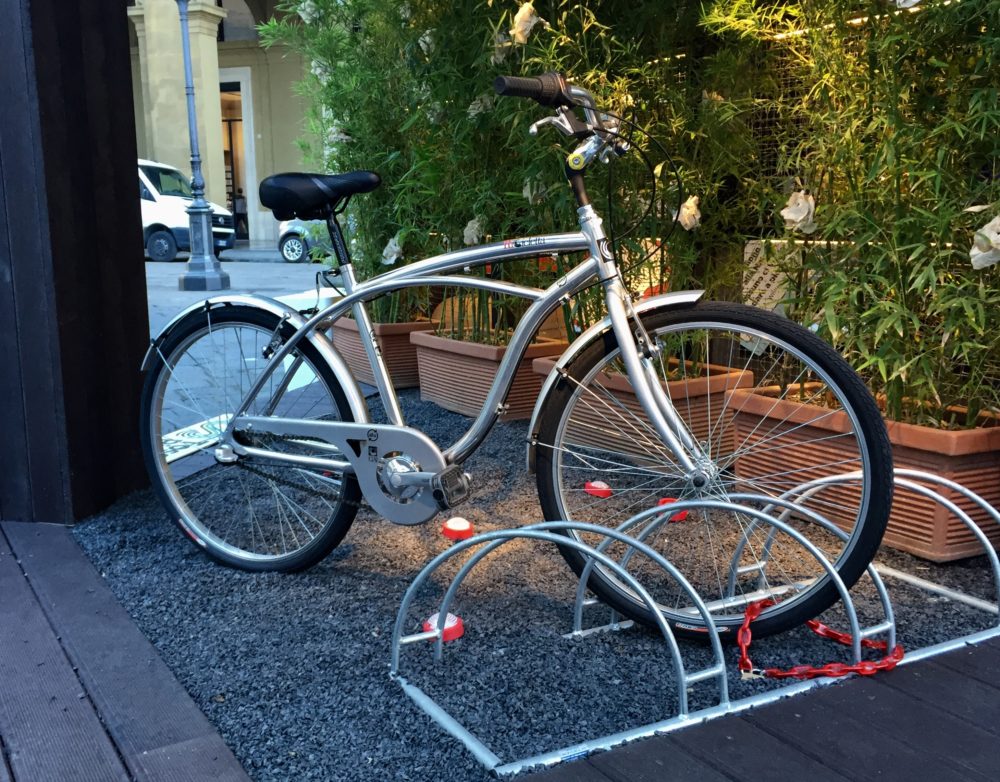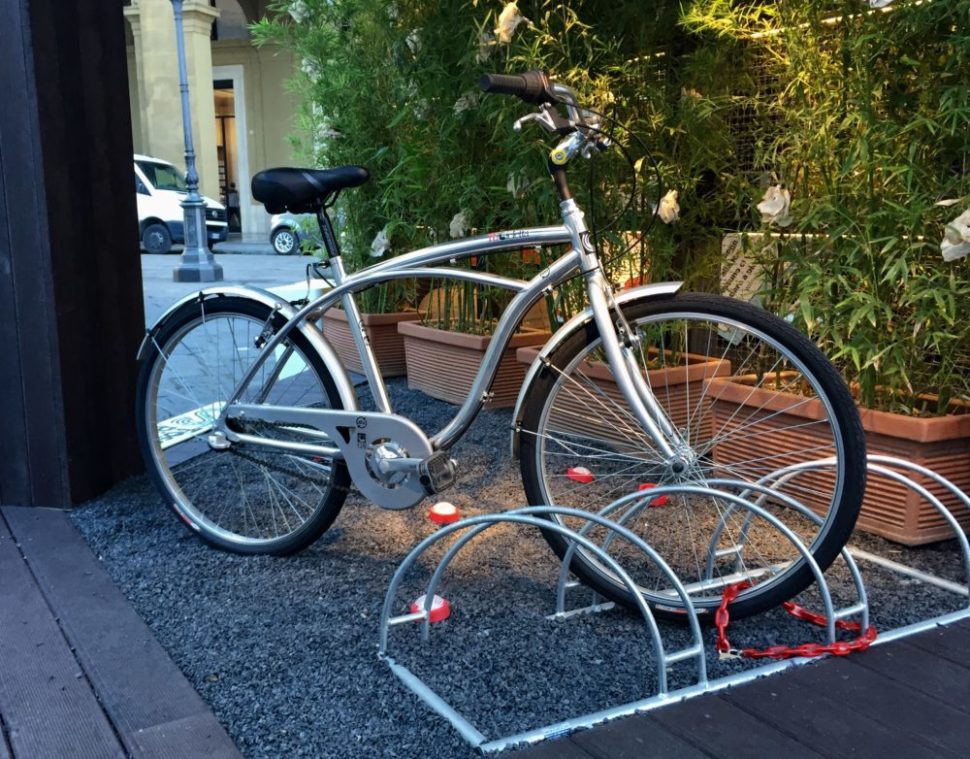In a recent interactive demo, the Florence-area waste management company Quadrifoglio showcased a variety of fully-functional objects made from materials collected by the company’s recycling program.
Full of artistic masterpieces and host to great innovators like da Vinci and Brunelleschi, Florence, Italy continues its centuries-old innovative tradition by implementing next-gen waste management solutions for an ancient city.
Quadrifoglio is a majority public corporation responsible for waste management in the Florence metropolitan area located in Tuscany, Italy. The company’s name means “four-leaf clover” in Italian, and reflects the four categories of refuse that they collect: all trash as well as recyclables separated among glass, aluminum cans and a variety of plastics.
In some areas, they have composting programs that are expanding quickly and even collect used clothes to be donated to local charitable organizations.
The community that Quadrifoglio and its partners serve is located in a region where maintaining a minimal impact on the environment from human activities is central to both the local and national economies.
“It’s not love that last forever – it’s plastic.” – O’Reilly’s Observation
In addition to several UNESCO World Heritage sites in Florence and the surrounding areas, Tuscany’s rich soil is important because it is also responsible for their characteristic wines, cuisine and pristine forest-lined coasts that attract millions of international visitors annually.

Trashcans in Disguise
Therefore, Quadrifoglio has the unique challenge of designing and implementing next-gen solutions for centuries-old architecture not always easily modernized.
One solution looks like something out of Transformers and gives tourists a show every time the city takes out the trash: huge underground garbage containers hidden in plain sight.
Think of the way a mailbox on the corner works: you pull the metal bar toward you to open a kind of shoot, toss your letter inside, and push the lever back to close the mailbox’s mouth to deposit your mail into the rectangular bin at bottom of the mailbox.
In a similar fashion, there are rows of metallic bins that resemble short post office boxes all over the historical center of Florence. There are usually three or four together along the medieval sidewalk, each designated for separate materials like glass, plastic or paper.
Just like the mailman comes by to collects the mailbox contents, designated Quadrifoglio trucks lift the entire receptacle out of the ground and about 12 feet in the air to reveal a huge underground container that is emptied into the truck and then replaced inconspicuously on the medieval sidewalk.
This innovative design not only helps Quadrifolgio more effectively collect waste in dense urban areas but to also to maximize space limited by narrow medieval streets and ancient architecture.
In a city that receives close to 16 million tourists per year, Quadrifoglio is under constant pressure to design solutions that don’t obstruct the city’s beauty that attracts so many but can also handle the immense amount of trash that comes with all the guests.
Going Beyond Just Collecting by Creating
Beyond just collecting trash, Quadrifoglio is also designing innovative solutions for recycling the waste that they collect.
What’s more, they’re showing the potential to create commercially viable literally from garbage.
Walking through the holiday markets in Piazza della Repubblica in Florence reminds visitors immediately that it has always been a crowded commercial center. It was the site of the Roman forum, and then a medieval marketplace during Florence’s rise as one of the first banking hubs in renaissance Europe.

This year, visitors to the plaza noticed a different cabin in the market square, and this display wasn’t selling anything for the holidays.
Instead, the equivalent of the local sanitation department had built what looked like a log cabin brimming with plants, elegant furnishings, and a sleek metallic bike- all made from materials the waste management company had collected.
The ultra-light aluminum bike kicked back in front of a spa-quality glass wall made from recycled multicolored glass bottles, and retro paper chandeliers hung overhead.
Bikes are a zero-emissions form of transportation, and more city planners are incorporating next-gen bike paths into modern designs. Affordable and lightweight bikes made from recycled materials could help incentive biking and even reduce emissions in urban areas while still moving more people into city centers with less car congestion.

Last summer’s garbage crisis in Rome left the imperial capital city, as NPR aptly reported, literally “down in the dumps”, not only raising accusations of political corruption in public services, but also presenting a public health risk in a major European city in the middle of a smoldering summer.
Amidst sanitation sector scandals like the one in Rome, Quadrifoglio’s cabin in Florence was a successful public education campaign partially because it emphasized transparency in its operations.

The campaign didn’t just tell what it was doing, it showed.
And it didn’t just show with a screen, it leveraged useful products central to everyday life to give visitors an example of how we can better use what we have.
A group of school children on a field trip kicked around gravel made entirely of recycled plastic gravel designed and produced by Revert, leading plastic recycling company in the region.
Revert specializes in repurposing plastic trash into polyurethane and polypropylene pellets. Because the pellets are highly malleable just like the original plastics used to produce them, they can be sorted into a variety of colors, densities and shapes.

An interactive screen explained the life cycle of Quadrifologio’s recycling and waste management operations.
The discussions highlighted the company's more efficient circular processes that cut waste by incorporating more of it into production.Click To TweetBenefits and Applications Quadrifoglio’s Programs Highlight
The entire cabin and all the furnishings inside took less than a day to install and took just as little time to break down once the week-long display had finished.
Therefore, because the plastic panels are made of recycled materials and are more lightweight when compared to traditional wood or plywood panels, installing these structures requires less time and less labor.
This, in turn, helps reduce the costs of temporary structures without necessarily sacrificing certain quality standards.

Furthermore, the fact that these structures can be installed quickly and easily also means that they also have enormous potential as temporary shelters for disaster victims.
Minimizing Impact and Maximizing Efficiency
Leeching concerns will still be an issue, but this program aims to extend the lifespan of plastics so that they don’t pile up in landfills as quickly.
In the short term, however, this kind of versatile plastic repurposing could be used in both conventional and additive manufacturing to bridge the gap between current packaging and next-gen biodegradable options.
Solutions like this won’t solve the problem, but they will help us deal with it.
To truly solve the issue of slowly degrading and potentially harmful materials in landfills, we’ll need to design new biodegradable materials and trim down production packaging with shorter supply chains.
Quadrifoglio’s programs and processes may not solve the problem completely, but they are helping get the most use out of the materials we have now with minimal impact.
For foreigners and Italians alike, food is undoubtedly central to the peninsula’s culture. In the face of lower quality foreign imports, Italy’s “0 Km” movement emphasizes buying produce and with the fewest distance from producer to market. Similar to the “farm-to-table” trend, 0 Km aims to limit transport-related emissions, maximize freshness and prioritize local businesses.
Preserving supply and reducing waste are central to any business; Tuscany’s industry leaders like Quadrifoglio and Revert combined with the 0 km attitude in general are driving this next-gen trend.
















Comments (0)
Most Recent